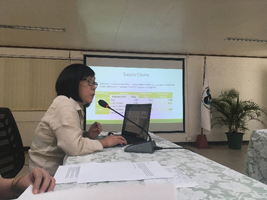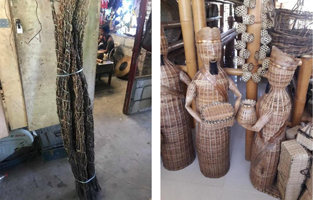 A study titled “Supply Chain Improvement of Commercially Important Forest Vines in Selected Areas in the Philippines” found that there are three major handicraft production and supply networks in the country. These are in Quezon-Batangas-Camarines, Bohol-Cebu, and Aklan. The major processes along the chain are vine extraction or gathering, handicraft production, vine consolidating, and trading.
A study titled “Supply Chain Improvement of Commercially Important Forest Vines in Selected Areas in the Philippines” found that there are three major handicraft production and supply networks in the country. These are in Quezon-Batangas-Camarines, Bohol-Cebu, and Aklan. The major processes along the chain are vine extraction or gathering, handicraft production, vine consolidating, and trading.
These findings were discussed during a midterm review, a monitoring and evaluation activity, conducted by the Socio-Economics Research Division (SERD) of the Philippine Council for Agriculture, Aquatic and Natural Resources Research and Development of the Department of Science and Technology (DOST-PCAARRD).
The project, which will end on November 2019, is expected to complete the supply chain analysis, including the identification of activities and processes along the chain; analysis in the flow of product information and payment; determination of the logistic issues (transportation, sourcing of inputs, and packaging); and identification of external influences (i.e., policies and ordinances).
 Headed by Carolyn C. Garcia of the Forest Products Research and Development Institute (DOST-FPRDI), the project aims to provide recommendation for improvement in the supply chain towards efficient and effective production and marketing of forest vines.
Headed by Carolyn C. Garcia of the Forest Products Research and Development Institute (DOST-FPRDI), the project aims to provide recommendation for improvement in the supply chain towards efficient and effective production and marketing of forest vines.
Forest vines are largely abundant in the Philippine forests. In fact, the country is the second largest world producer of handicrafts. Vines, specifically forest vines, are one of the least studied non-timber forest products in the country. While there is a seemingly abundant supply of forest vines in the Philippine forests, the country is still experiencing problem on export due to insufficient supply of raw materials and stiff competition from ASEAN counterparts.
 This is the result of problems and challenges affecting the forest vine industry. Among them is the inefficient extraction and processing technology, and lack of raw material supply among others.
This is the result of problems and challenges affecting the forest vine industry. Among them is the inefficient extraction and processing technology, and lack of raw material supply among others.
The midterm review was conducted on February 6, 2019 at PCAARRD. It was facilitated by SERD under the leadership of Dr. Ernesto Brown. The meeting was also attended by Forester Mario DR. Ramos and Dr. Nimfa K. Torreta, Biodiversity Industry Strategic S&T Program (ISP) Manager of the Forestry and Environment Research Division of PCAARRD.
